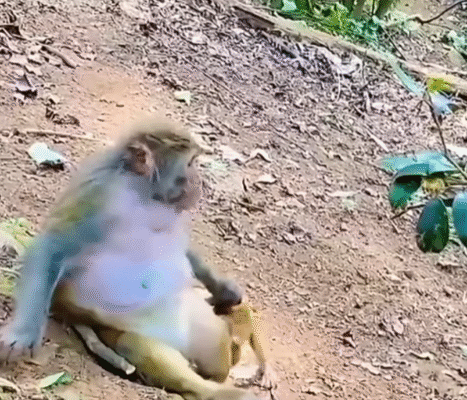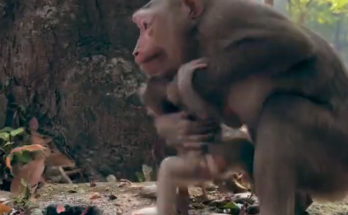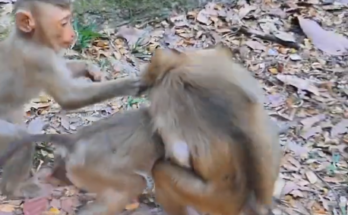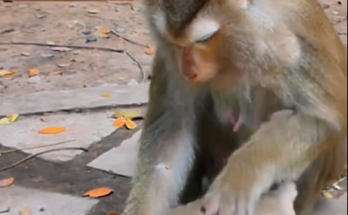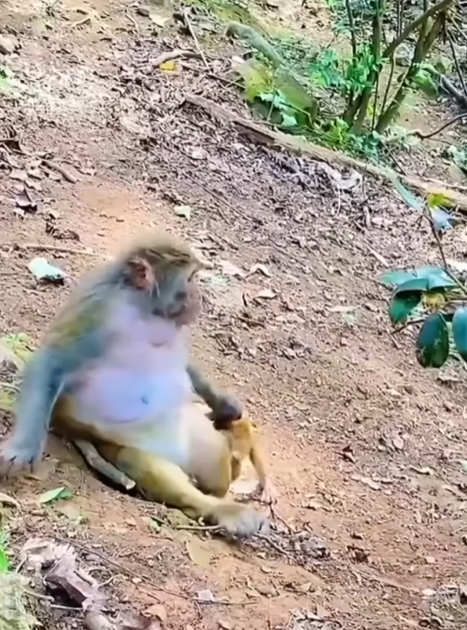
In the animal kingdom, parenting comes in many forms, ranging from gentle nurturing to what might be called “tough love.” Among monkeys, this tough love is not cruelty but a fascinating form of preparation—a way to teach resilience, independence, and essential survival skills. One of the most striking examples is how monkey mothers, aunts, and even older siblings play a unique role in strengthening a baby’s legs. This behavior, seemingly harsh at first glance, is a deeply intentional and vital part of raising a young monkey capable of thriving in the wild.
The Challenge of Life in the Canopy
Monkeys, especially those living in forested areas, navigate a challenging three-dimensional world. They climb, leap, and swing between trees with remarkable precision. The ability to move efficiently and safely through the canopy is essential to survival.
For a young monkey, weak legs are a serious risk. Falls from trees can be fatal, and clumsy movements can prevent the baby from reaching food or escaping predators. Therefore, a monkey’s early development prioritizes muscle strength, coordination, and balance—all centered on the legs and lower body.
It is here that the concept of “tough love” becomes apparent. The playful yet firm guidance of adults in the troop helps babies build the physical skills necessary for independence, long before they encounter real danger.
Tough Love in Action
Observing monkey troops, researchers often notice what looks like rough treatment of infants. Mothers may pull, prod, or even let go briefly while the baby clings, encouraging the baby to stretch, hold on, and strengthen leg and core muscles.
At first glance, this behavior may appear harsh. A baby monkey may stumble or tumble, seemingly in distress. But these moments are carefully balanced: the adult is always nearby, ready to intervene if needed. The intention is never harm but education. The baby learns that the world requires effort, coordination, and strength.
This approach mirrors the principle of “learning through challenge.” By facing small obstacles in a controlled environment, the infant develops the physical and mental tools necessary for survival.
The Mechanics of Leg Strengthening
The process of strengthening a monkey baby’s legs involves several natural behaviors:
- Climbing and Holding: Mothers encourage babies to climb branches and cling with their hands and feet. The baby’s legs grip tightly, engaging muscles that will later support jumps and running.
- Standing and Balancing: Some mothers hold babies above the ground, letting them stand or attempt small steps. Even brief moments of weight-bearing challenge the legs and improve balance.
- Play and Wrestling: Older siblings or peers engage babies in playful tussles. These interactions may push, nudge, or gently wrestle the infant, prompting leg movement and strengthening through playful resistance.
- Controlled Falls: Mothers occasionally allow babies to slip or fall slightly, ensuring the baby reflexively grasps branches or uses legs to recover. These micro-falls teach coordination, leg strength, and agility.
Through these methods, a baby monkey’s legs develop faster and stronger than mere passive movement could achieve. Over time, these small lessons accumulate into remarkable athleticism essential for climbing, leaping, and escaping danger.
Why Leg Strength Matters
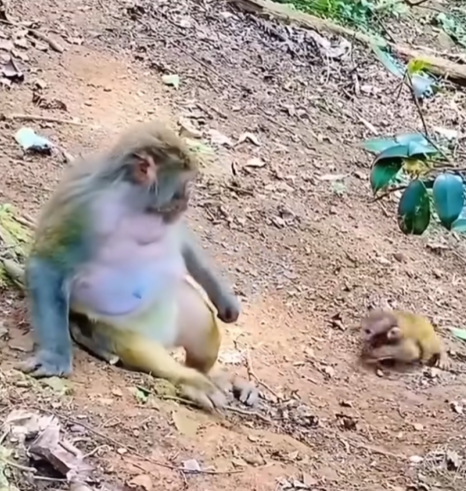
In the wild, a monkey’s legs are more than just limbs—they are lifelines. Strong, coordinated legs allow the infant to:
- Climb efficiently through branches of varying thickness.
- Jump and swing between trees without falling.
- Escape predators by moving quickly through the canopy or along the ground.
- Participate in foraging and food acquisition alongside adults.
- Develop independence, reducing reliance on constant parental support.
Without early leg training, a monkey’s survival odds diminish significantly. Nature has shaped tough love as an evolutionary tool, ensuring infants develop the skills necessary to thrive.
Mental and Emotional Development Through Tough Love
Leg-strengthening exercises are not purely physical—they also have profound mental and emotional benefits. Babies learn resilience, problem-solving, and confidence. When a mother lets a baby baby slip or fall while climbing, the infant must think quickly, adjust, and try again. This experience fosters courage and adaptability.
Moreover, social learning is critical. Observing older monkeys navigate obstacles teaches babies about strategy, timing, and technique. The young ones learn not only from direct experience but also through observation, internalizing behaviors that will guide them through life.
Even the discipline-like aspects of tough love—nudging, guiding, and correcting—help infants understand boundaries and expectations within the troop. They develop not just strong legs, but strong social awareness.
A Mother’s Perspective
For a monkey mother, tough love is a careful balance. She must ensure the baby is challenged but not endangered. Her instincts guide her: she pushes the infant just enough to encourage growth, always ready to catch, support, or calm if necessary.
This approach demonstrates a deep understanding of the baby’s capabilities and limitations. Mothers intuitively know when to let go and when to intervene, striking a balance between risk and safety.
It is remarkable to see how much trust exists between the mother and her infant. The baby learns to rely on its own strength while also knowing the mother is always near for protection. This trust is the foundation for both physical and emotional development.
Lessons for Humans
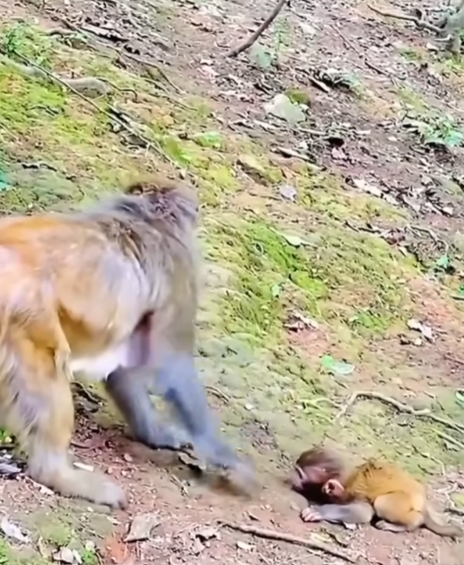
Observing monkey parenting provides valuable lessons for human caregivers. While we don’t rely on trees for survival, the principle of strength through gentle challenge is universal. Children benefit from experiences that test their limits in safe ways—climbing, exploring, problem-solving, and learning to recover from small setbacks.
In human terms, this could be allowing toddlers to navigate playground equipment independently, encouraging older children to try new sports, or supporting adolescents in solving real-world problems without immediate intervention. Just as in monkey parenting, the goal is to strengthen skills, confidence, and independence through experience—not overprotection.
The Balance of Love and Discipline
Tough love in monkeys is not about punishment—it is about preparation. It teaches essential survival skills while reinforcing emotional bonds. The key is presence and support: the mother is always nearby, providing reassurance while letting the infant face challenges.
This balance mirrors the delicate interplay of challenge and safety in life. The infant learns that effort yields reward, that mistakes are opportunities to learn, and that resilience is built through experience. In essence, a monkey’s tough love is a masterclass in parenting that integrates physical, mental, and emotional growth.
Conclusion
The seemingly harsh lessons of a monkey mother are, in reality, acts of profound care. By focusing on strengthening a baby’s legs, the mother ensures the infant is prepared for the physical and social demands of life. She uses controlled challenges, gentle nudges, and guided play to teach essential skills while maintaining emotional support and trust.
Monkey infants emerge stronger, more coordinated, and more confident because of this unique form of parenting. Their legs, trained through effort and perseverance, carry them safely through the canopy and beyond. Their minds and hearts, nurtured alongside their bodies, learn resilience, trust, and social awareness.
In witnessing a monkey mother’s tough love, we see the remarkable intelligence of nature’s design: every action, however small, serves a purpose. The unique focus on strengthening the baby’s legs is a vivid reminder that parenting is about preparing the young for the world—not shielding them from it.
And so, in every leap, every step, every grasping motion of a young monkey, we see the outcome of careful guidance, love tempered with challenge, and the timeless wisdom of evolution. The tough love of a monkey mother is a story of survival, growth, and the beauty of life’s lessons passed from one generation to the next.
